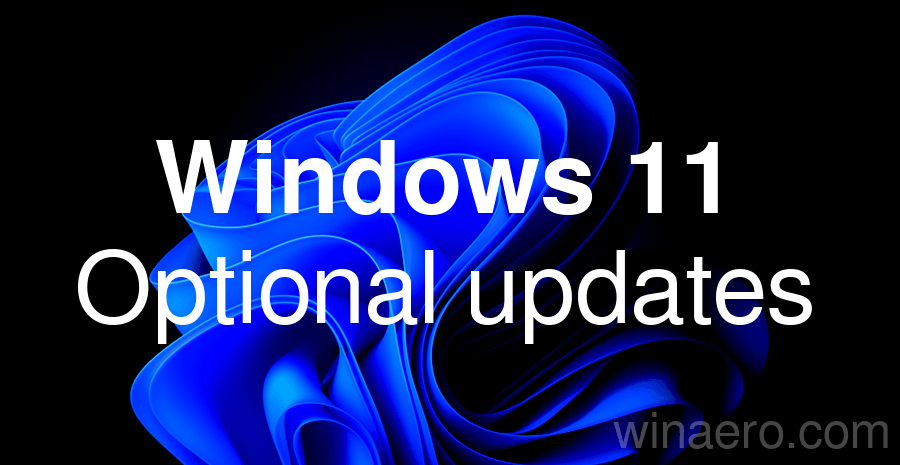Microsoft today released an optional patch KB5012643 for Windows 11. The update raises the OS version to Build 22000.652. It is notable for adding improvements for servicing the Secure Boot component, video playback fixes. Also, it resolves a bug that can cause a slow startup or even a crash at boot.

On some hardware, the bug could cause a delay for up to 40 minutes when starting or restarting the OS.
Advertisеment
This update is a "C-release" that the user have to install manually if he wants. The update appears in the Settings app in the optional updates section. It will be installed if the user select. As an alternative option, one can download it from the Microsoft Update Catalog here.
What's new in KB5012643 for Windows 11 (Build 22000.652)
- New! Adds improvements for servicing the Secure Boot component of Windows.
- Addresses an issue that causes the AppX Deployment Service (AppXSvc) to stop working after you install certain MSIX apps.
- Addresses a race condition that occurs early in the startup process that might cause a stop error.
- Improves the Autopilot client to process updated Trusted Platform Module (TPM) capabilities that support self-deployment and pre-provisioning scenarios.
- Changes the timeout for Azure Active Directory (Azure AD) registration from 60 minutes to 90 minutes for hybrid Azure AD-joined Autopilot scenarios. This also addresses a race condition that causes an exception at timeout.
- Addresses an issue in which certain Point of Sale terminals experience occasional OS startup delays during restart of up to 40 minutes.
- Addresses a memory leak issue that affects Windows systems that are in use 24 hours each day of the week.
- Addresses an issue that affects the Dynamic Host Configuration Protocol (DHCP) option 119 (Domain Search Option) by preventing the use of the connection-specific DNS Suffix Search List.
- Addresses an issue that affects the Title attribute in Microsoft Ege IE mode.
- Addresses an issue in which mobile device management (MDM) policies were not allowed on Windows Enterprise editions that were upgraded to Enterprise using Azure AD-joined subscription entitlement.
- Addresses an issue that might cause video subtitles to be partially cut off.
- Addresses an issue that incorrectly aligns video subtitles.
- Addresses an issue that causes Kerberos authentication to fail, and the error is “0xc0030009 (RPC_NT_NULL_REF_POINTER)”. This occurs when a client machine attempts to use the Remote Desktop Protocol (RDP) to connect to another machine while Remote Credential Guard is enabled.
- Addresses an issue that causes Windows to go into BitLocker recovery after a servicing update.
- Addresses an issue that prevents retrieval of the Endorsement Key (EK) certificate from the TPM device.
- Addresses an issue that might fail to copy the security portion of a Group Policy to a machine.
- Addresses an issue that prevents the instantiation of the Microsoft RDP Client Control, version 11 and higher, inside a Microsoft Foundation Class (MFC) dialog.
- Displays the temperature on top of the weather icon on the taskbar.
- Addresses an issue that prevents you from using the minimize, maximize, and close buttons on a maximized app window. This issue occurs because the Notification Center keeps the input focus.
- Addresses an issue that might occur when you use Netdom.exe or the Active Directory Domains and Trusts snap-in to list or modify name suffixes routing. These procedures might fail. The error message is, "Insufficient system resources exist to complete the requested service." This issue occurs after installing the January 2022 security update on the primary domain controller emulator (PDCe).
- Addresses an issue that causes the primary domain controller (PDC) of the root domain to generate warning and error events in the System log. This issue occurs when the PDC incorrectly tries to scan outgoing-only trusts.
- Addresses an issue that occurs when you map a network drive to a Server Message Block version 1 (SMBv1) share. After restarting the OS, you cannot access that network drive.
- Addresses an issue that affects an SMB multichannel connection and might generate a 13A or C2 error.
- Addresses an issue that damages a pool when a Client-Side Caching (CSC) cleanup method fails to delete a resource that was created.
- Addresses an issue that might cause the server to lock up because the nonpaged pool grows and uses up all memory. After a restart, the same issue occurs again when you try to repair the damage.
- Reduces the overhead of resource contention in high input/output operations per second (IOPS) scenarios that have many threads contending on a single file.
You can check out the official change log here.
Support us
Winaero greatly relies on your support. You can help the site keep bringing you interesting and useful content and software by using these options:
